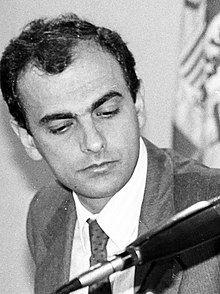
The 1986 Spanish general election was held on Sunday, 22 June 1986, to elect the 3rd Cortes Generales of the Kingdom of Spain. All 350 seats in the Congress of Deputies were up for election, as well as 208 of 254 seats in the Senate.
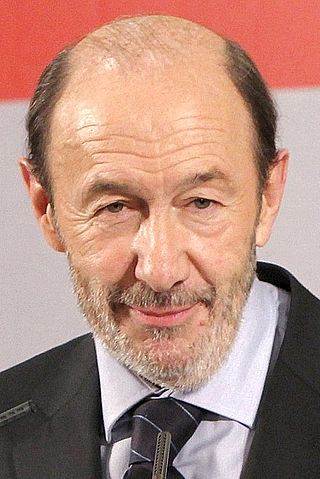
Alfredo Pérez Rubalcaba was a Spanish statesman, politician and chemist who served as Deputy Prime Minister of Spain from 2010 to 2011, and previously as Minister of Education from 1992 to 1993, as Minister of the Presidency from 1993 to 1996, as Minister of the Interior from 2006 to 2011 and as acting Minister of Defence between May and June 2008.

The second government of Adolfo Suárez was formed on 5 July 1977, following the latter's confirmation as Prime Minister of Spain by King Juan Carlos I on 17 June, as a result of the Union of the Democratic Centre (UCD) emerging as the largest parliamentary force at the 1977 general election. It succeeded the first Suárez government and was the Government of Spain from 5 July 1977 to 6 April 1979, a total of 640 days, or 1 year, 9 months and 1 day.

The Ministry of Industry, Trade and Tourism (MINCOTUR) is the department of the Government of Spain responsible for the proposal and execution of the government policy on industry, trade and tourism, including among its competences the industrial development and of the SMEs, the promotion and defense of the industrial property, the commercial policy of internationalization and of investments and external transactions, as well as the politics of tourism and the rest of competences and attributions that the legal system attributes to it. Likewise, in coordination with the Foreign Ministry is responsible for the international cooperation on this matters.

The 35th Federal Congress of the Spanish Socialist Workers' Party was held in Madrid from 21 to 23 July 2000 to renovate the governing bodies of the Spanish Socialist Workers' Party (PSOE) and establish the party's main lines of action and strategy for the next leadership term. It was held after the party's defeat in the 2000 general election and the subsequent resignation of then secretary-general Joaquín Almunia.

Pedro Sánchez Pérez-Castejón is a Spanish politician who has been Prime Minister of Spain since June 2018. He has also been Secretary-General of the Spanish Socialist Workers' Party (PSOE) since June 2017, having previously held that office from 2014 to 2016. Moreover, Sánchez is the current President of the Socialist International, having been elected to that position in November 2022.

The first government of Adolfo Suárez was formed on 8 July 1976, following the latter's appointment as Prime Minister of Spain by King Juan Carlos I on 3 July and his swearing-in on 5 July, as a result of Carlos Arias Navarro's resignation from the post on 1 July 1976. It succeeded the second Arias Navarro government and was the Government of Spain from 8 July 1976 to 5 July 1977, a total of 362 days, or 11 months and 27 days.
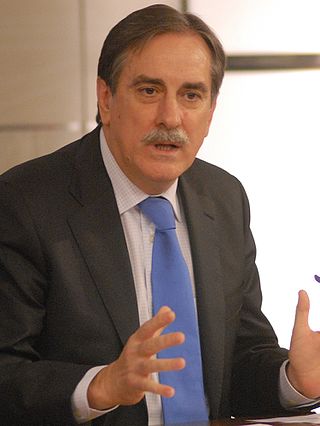
Tomás Valeriano Gómez Sánchez is a Spanish socialist politician and economist. From 21 October 2010 to 22 December 2011 was the Minister of Labor and Immigration in the ninth legislature under the presidency of José Luis Rodríguez Zapatero.

María Jesús San Segundo Gómez de Cadiñanos, was a Spanish economist, academic, diplomat and politician, minister of Education and Science of Spain between 2004 and 2006.

José Teófilo Serrano Beltrán is a Spanish politician, civil servant and engineer, member of the Spanish Socialist Workers' Party (PSOE).

Manuel de la Rocha Rubí is a Spanish politician of the Spanish Socialist Workers' Party (PSOE). A member of the 1st and 2nd terms of the Assembly of Madrid as well as of the 5th, 9th and 10th Congress of Deputies, he has served as Mayor of Fuenlabrada from 1979 to 1983 and as Minister of Education and Youth of the Community of Madrid from 1983 to 1985.
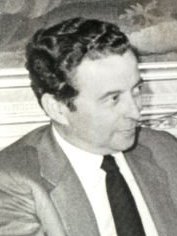
Alberto Carlos Oliart Saussol was a Spanish politician and executive. He was a government minister three times during the Spanish transition to democracy and chairman of Spanish Radio and Television Corporation between 2009 and 2011.

The first government of José Luis Rodríguez Zapatero was formed on 18 April 2004, following the latter's election as Prime Minister of Spain by the Congress of Deputies on 16 April and his swearing-in on 17 April, as a result of the Spanish Socialist Workers' Party (PSOE) emerging as the largest parliamentary force at the 2004 Spanish general election. It succeeded the second Aznar government and was the Government of Spain from 18 April 2004 to 14 April 2008, a total of 1,457 days, or 3 years, 11 months and 27 days.

The second government of José Luis Rodríguez Zapatero was formed on 14 April 2008, following the latter's election as Prime Minister of Spain by the Congress of Deputies on 11 April and his swearing-in on 12 April, as a result of the Spanish Socialist Workers' Party (PSOE) emerging as the largest parliamentary force at the 2008 Spanish general election. It succeeded the first Zapatero government and was the Government of Spain from 14 April 2008 to 22 December 2011, a total of 1,347 days, or 3 years, 8 months and 8 days.

The first government of Mariano Rajoy was formed on 22 December 2011, following the latter's election as Prime Minister of Spain by the Congress of Deputies on 20 December and his swearing-in on 21 December, as a result of the People's Party (PP) emerging as the largest parliamentary force at the 2011 Spanish general election. It succeeded the second Zapatero government and was the Government of Spain from 22 December 2011 to 4 November 2016, a total of 1,779 days, or 4 years, 10 months and 13 days.

The third government of Felipe González was formed on 7 December 1989, following the latter's election as Prime Minister of Spain by the Congress of Deputies on 5 December and his swearing-in on 6 December, as a result of the Spanish Socialist Workers' Party (PSOE) emerging as the largest parliamentary force at the 1989 Spanish general election. It succeeded the second González government and was the Government of Spain from 7 December 1989 to 14 July 1993, a total of 1,315 days, or 3 years, 7 months and 7 days.

The fourth government of Felipe González was formed on 14 July 1993, following the latter's election as Prime Minister of Spain by the Congress of Deputies on 9 July and his swearing-in on 13 July, as a result of the Spanish Socialist Workers' Party (PSOE) emerging as the largest parliamentary force at the 1993 Spanish general election. It succeeded the third González government and was the Government of Spain from 14 July 1993 to 6 May 1996, a total of 1,027 days, or 2 years, 9 months and 22 days.
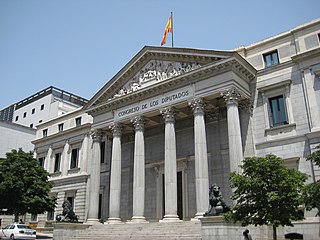
The 14th Congress of Deputies is the current meeting of the Congress of Deputies, the lower house of the Spanish Cortes Generales, with the membership determined by the results of the general election held on 10 November 2019. The congress met for the first time on 3 December 2019. According to the Constitution of Spain the maximum legislative term of the congress is 4 years from the preceding election.

The second government of Pedro Sánchez was formed on 13 January 2020, following the latter's election as Prime Minister of Spain by the Congress of Deputies on 7 January and his swearing-in on 8 January, as a result of the Spanish Socialist Workers' Party (PSOE) emerging as the largest parliamentary force at the November 2019 general election. It succeeded the first Sánchez government and is the incumbent Government of Spain since 13 January 2020, a total of 1,346 days, or 3 years, 8 months and 7 days.

Manuel Francisco Clavero Arévalo was a Spanish lawyer and politician who as Assistant Minister of the Regions between July 1977 and April 1979 contributed to the construction of the current State of Autonomies in Spain. He also served as Minister of Culture from April 1979 to January 1980.
